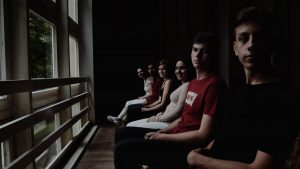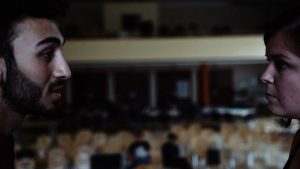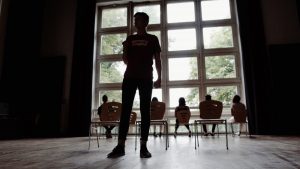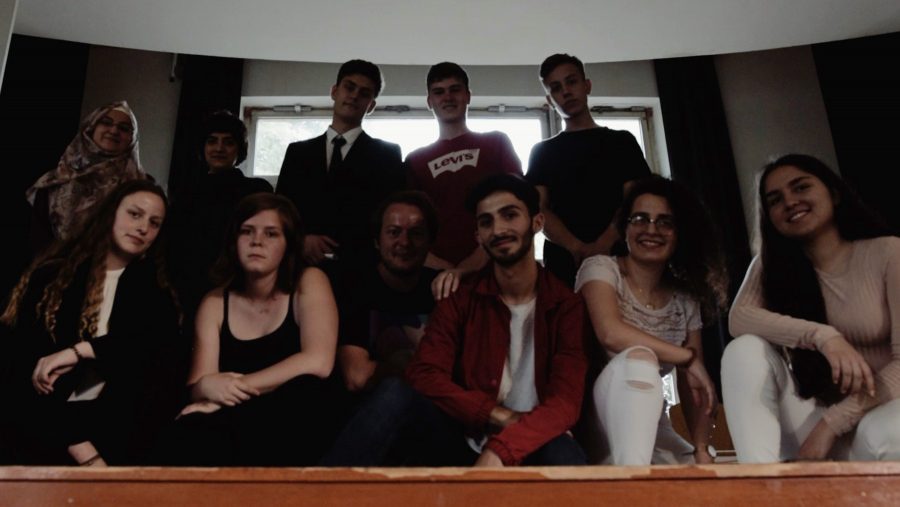There’s a breath of fresh air coming from Cambridge University to Berlin. Bard College Berlin alumna Maria Khan (BA HAST 2015) is currently working on a unique PhD project on German Literature and Education. She had the idea to break with mainstream discourse and instead research Muslim integration in consultation with Goethe, the most famous (dead) German poet. What does Maria do? She uses the tragic play Faust, the story of a deeply depressed doctor who is unsatisfied with life and thus makes a pact with the devil, to explore the identity of Turkish-German students and empower students in general to voice their lived experiences through literature and theater. I had the unique privilege of accompanying her for this exciting experiment in German high-schools for over half a year. This is a story of tears and truths, to be continued …
Maria’s educational path inspired her to look at contemporary issues with critical creativity. On her transition from Bard College Berlin to Cambridge University, where she completed a Master’s in Arts Education before starting this PhD project in 2016, she says,
“I had spent four years drowned in classical education and I had grown so exponentially, but I wanted a program through which I could see an application of the ideas which I encountered through my humanities based education at Bard. In Cambridge, my MPhil allowed me to use my humanities-based training in literature and drama and see the impact one could make in the real world.”
For her PhD Maria left the Education Department and moved to the Department of Modern and Medieval Languages (the German and Dutch branch). She was passionate about exploring how German classical literature can shed light on the Muslim integration issue within an educational setting. For this endeavour, Maria chose the tragedy Faust by Goethe because it captures the tension between religion and modernity. As a Muslim, she finds the same tensions reflected in the discussions on whether Islam is compatible with modernity or not. This question is circulated often amidst the integration debate and she feels that no one can truly answer this question. To deeply explore the problem of Muslim integration and leave theoretical discussions behind, Maria decided to practice theater based on Faust with highschool Turkish-German students of Muslim background in Berlin — though the classes have been ethnically diverse. She was interested in observing how Islam shapes the responses of individuals to Western liberal ideas. So, over a period of seven months, she and her research assistants led two theater classes through a performance-based reading of Faust: the students expressed parts of their identity regarding religion, politics, the role of family, socio-economic status and sexuality. After warm-ups, on stage, the pupils and I would stand in a circle and read an excerpt of the piece; this was followed by a short reflection round, and then we would prepare performances in response to specific exercise prompts, which were filmed.
On why she took this dynamic approach, Maria says:
“… Most of the research on Muslim integration is static and dull in the sense that it explores identity-related concerns through question-answers or life studies etc. A small amount of research on this topic looks at the problem through the lens of a literary text or a piece of art. My research is set within artistic methodology. I use a literary text to explore the identity of young Turkish-German students, i.e. studying the question of what relationship they have personally with Islam — the Islam they were introduced to as children and the Islam which they encounter in media, in society. Through discussions on Faust, I am able to trace the web of this relationship, the fine lines which separate the different types of relationships young people have with religion(s), the one they have and the ones they know of. Somewhere in the middle of this web and this mess are the answers to two main questions: Can Muslims integrate or not? And what do we mean by the concept of integration after looking at this?”

What the students came up with under our guidance was impressive and brilliant. Once, based on a scene in which the character Faust contemplated committing suicide but was stopped from doing so by the church bell, the pupils were directed to play out the following exercise in two groups: Somebody in a certain religious community — a Christian or Muslim community — decides to leave the country to live in a forest and totally withdraw from their community because they are unhappy (unhappiness thus becomes an analogy for suicide). His mother consults the leader of each religious community to ask if they can change the mind of her son. So we divided the student body into two groups: one scene was staged in a Christian community and the other in a Muslim community.
I was the spectator and analyzer because I led the discussions about the performances afterwards. What I saw in this session was so profound that I still remember it clearly. The group playing the mosque community built a conversation between a mother and an Imam (a religious leader). The mother desperately consulted the Imam, asking him for advice about her son, but all he told her was to remain patient and pray, repeatedly. This scene was especially memorable for me because, as a Muslim, I witness and criticize the disengaged, unqualified, passive religious authorities who give destructive psychological advice. With tragic consequences, the narrative often exists within the Muslim community that theological knowledge qualifies someone for psychological advising. They played this scene because it was familiar to them, because they had experienced it. This short performance already gave insight into how Muslim youth can perceive their community centers and the profound structural issues that exist there.
Another interesting insight came when we gave the students the task of enacting romantic relationships. I remember how a German student played a woman who fell in love with a Muslim man and thus converted to Islam in the story. To embody the Muslim woman, she bound some fabric around her head and explained to her family that she has converted to Islam. She constantly emphasized that this means she cannot eat pork anymore and that Islam saves us all. For me, this was eye-opening. What do German people actually know about Islam, and what are the causes of superficial knowledge? Of course the religion is about more than not eating pork and all-saving promises. At its core is the devotion to one God with a sincere heart. But how important is it to know the basics of that religion, and why is it important? Who is responsible for misunderstandings? Does the superficiality testify to a poor communication between people with diverse backgrounds? Again, one short performance opens the door for asking the most important questions, which many books and theories on ethnically diverse societies cannot do because they do not allow the same immediacy of experience.

The cultural differences and perceptions also became clear in other exercises. Maria noticed “how different concepts exist in different cultures.” She explains:
“For example, when people are teenagers, how they express romance or sexuality is very different. And so in both cultures this could be a matter of deep misunderstanding on either side. Some German person can look at a Turkish person and say, ‘Oh, they don’t even know how to love.’ And Turkish people can say, ‘They don’t even know how to love.’ I think this is the conversation that’s missing. … If somebody is expressing the same thing in a different manner, does it mean it doesn’t exist for me? Or what I’m trying to ask is: Can we ever bridge this gap? If a community does not believe in God or does not follow the same rituals or does not follow the same religion, can we ever live with them?
At the heart of the integration problem is: Can two parallel cultures exist together or not? This is a very big question and it seems like we need emotional, very deep, raw conversations — honest conversations. Politics, politicians and the parliament cannot solve this anymore. They can’t sit there and say, ‘Let’s make a rule that everybody should respect Muslim women.’ This is a deeper issue. This is about liking people and disliking people. This is about emotions. It’s not about whether somebody lets you sit on the train or not. … There is no open violence going on against each other, but now we have to go a step deeper than this. … It’s about how people feel. And of course at the end of the day that goes back to basic training of empathy and compassion and love …”
This crucial insight makes clear that differences in ways of life are inevitable and will always exist. The question we must ask ourselves is how we as a society and individuals learn to navigate them. Do we respect world views and choices that differ from our own, or do they become a reason to devalue each other? This question shifts the focus from the validity of Islam and Muslims in Germany to concerns about nurturing the capacity in each and every human being to respect, tolerate and accept divergent philosophies of life and religious practices. This, in my opinion, is integration. Integration requires that every human being, with or without a migration background, lays down the weapons of hostility and superiority and looks at the other in honesty and openness to build togetherness.
This sounds idealistic: It is.
So instead of regarding religious and cultural differences as a problematic otherness, the project’s objective highlights the need for empathetic discourses in society. Thus the project transcends the topic of Muslim integration and opens up questions about human (co)existence, about the meaning individuals give life, which experiences shape it.
Maria continues,
“I think that stories, narratives, help us make sense of life, and so every human being is in need of a story or a narrative. We all need a bigger story than our own lives to understand our lives. That is why this project is about telling the story of Faust, looking at the story of Faust and finding meaning about our own life. In the future, I want to become a theatre director and I want to work on plays and stories that can help us make meaning out of our lives. This is why I do a lot of theatre in Cambridge as well as why in Berlin I was doing a lot, because I think it is a very important art form just like any other art. What it also does wonderfully is that it helps us understand truth. It helps us understand what is the meaning of truth and how to tell your truth, how to tell your story. So it has a lot of benefits. I think that, at the end of the day, the only thing that can bring us peace is truth. It seems that people struggle all their lives with not knowing how to tell the truth because they don’t know what truth is in any given situation. So what we are trying to do in our research is ask questions: What is the truth of the problem of integration? How do we truthfully talk about integration and not just get lost in the political jargon? To move away from the political, social, economic jargon and to come to the deep, human, emotional experience of integration in a foreign culture.”

What I’ve learned from the interview is that to shatter static and superficial notions about ourselves and break out of political discourses that yield no real change and have no depth, we have to rethink who we are as an individual and collectively as a society. Discussing Muslim integration in high-level circles without even understanding the depth of the emotional, cultural, religious and socio-economic dimension of the people involved won’t lead to fruitful results, and one only needs to look critically into German media culture about Islam to understand what I am referring to. Maria’s project is an example of how literature and theater can serve as a medium to explore socio-political issues differently and effectively. As her approach shows, arts in general allow one to understand the self, build and rebuild it, to take critical distance from the self and explore oneself deeply and differently.
This is exactly what we did in the last part of the project. Maria planned on giving the students a platform to authentically express themselves through autobiographical theater. Every student would prepare a text about their lives, called their “life letter”, which they had the choice to share in smaller groups. Everyone shared their life letter, honestly showing who they are, what they think, and what they have encountered in life. They were extremely courageous to do so, and I will never forget what I learnt about their lives. They made me realize how difficult and beautiful life can simultaneously be, and that everyone carries within themselves a story that testifies to the wonder of human existence. We helped them to connect their personal experiences to the stories of Geothe’s Faust and Marlow’s Faust so that each group developed a script and the students played out their life story as characters in the play. The final performance was filmed by the British Council and was made into a memorable short film.
When we were working on the autobiographical theater performance, I remember how we had these paired cards like in a memory game to help the students connect passages from Faust to their own lives. Each pair consisted of one card with a passage from Goethe’s Faust and a complementary card showing important life questions that could be extracted from the text passage. The students would then pick up two cards, read the text passage, then the questions, and try to answer them from personal experience. Here I learned that, no matter one’s background, readers can naturally tie their experiences to the text so that the material becomes a tool to contemplate one’s life. Tying this method back to Maria’s interest in exploring the identity of Turkish-German pupils with a Muslim background, I realized that her approach is successful because she accesses students’ lived experiences through arts more authentically than statistical analyses and methods of data collection ever could.
However, I sometimes wondered if what the students played out in the exercises were only mainstream imaginations of love and happiness, for example, or their real, honest opinions. Especially because they had to perform in groups, I questioned what space individual ideas had, especially the ones that differed from the cultural norm. Hence, I am very interested in how Maria will analyze and evaluate the performances and how she will draw insights from the lessons. She is currently working on the book for her PhD project, which she plans to complete by 2020. An insight she already shared is that
“an education based in Western humanities can assist students from Turkish-Muslim backgrounds in developing emotional and cultural responses to modern debates which clash with values inherited from Islam. My research suggests that a humanities-based education can help in developing an inner-dialogue with the world outside and allow young people to arrive at their own understanding of Islam and its response to modernity.”
What she describes here is what I experience almost daily: In my readings for classes, especially for philosophy and literature, I do what I think everyone does who engages deeply with the text: I think about my values and lived experiences in connection to the text. Another dimension of complexity comes in here because much of my experience of my life has been shaped by my belief in God, and thus I negotiate what I learn with my belief, which sometimes leads to wondrous realizations and sometimes to existential crises where I just need to withdraw for a while to think. I realized that howsoever this process of learning from texts and connecting them to the self feels — illuminating, gloomy, or something in between — most importantly, the texts allow the reader to deeply question the self and thus give a chance for authentic self-creation. It is like an invitation to all of us that we can choose to accept or not.
It has truly been a blessing to work with the students and Maria. The project has been enriching on an individual and societal level because of its alternative, arts-based method to explore Muslim integration and because it gave all students, with and without a migration background, a chance to authentically express themselves through the arts. It allowed rare, true, and authentic insights into the inner worlds of human beings and challenged the pupils to look into and think about themselves. The institution of school became more important than ever because students could learn about themselves and others in a protected environment.
Combining the arts with socio-political concerns through literature and theater should become a regular part of the curriculum at schools and is enriching to both students and teacher. Only raw and real reflection processes yield raw and real data that allow us to identify the deep-seated prejudices and emotional obstacles to living together. Once we have identified these obstacles, we can work to build a society that respectfully and openly negotiates differences without feelings of superiority or hostility.


Wow, beautiful approach to self-reflection. I hope you will keep it up. We definitely need more of this. School should not be about gaining information only, but more than anything about being able to truthfully self-reflect and handle ones own emotions, thoughts and deeds. Also, beautifully written. I could feel the authenticity and the deep impact the work had on the author.